Erabadu blossoms
By Gamini G. Punchihewa
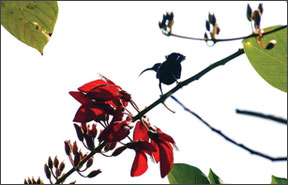 |
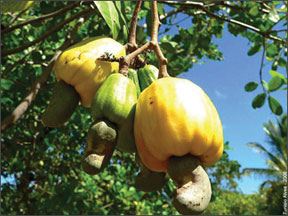
Nuts used for the game of Wala Kaju |
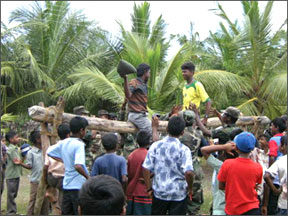 |
| Giving it
another try |
Swinging in the traditional Onchillawa (the swing) is the most
spectacular sight that ushers in the dawn of the New Year.
The village boys and girls swing merrily, singing the traditional
folk songs like the Onchili-chili-chilla-malai-vella-digata-nellie-kale’
synchronised with the traditional drums played by the elderly women
folks, thus conveying the glad tidings of the New year.
Many outdoor and indoor games inherent to the New Year festival had
their roots in ancient Lanka from the 3rd century BC to 1st century BC.
With the modern fast changing world, of changing customs time honoured
traditions, and age-old outdoor and indoor games are also changing fast.
Still in some remote corners in the backwoods such ancient games
survive.
In villages where cadju trees survived, the dried nuts are used in
theWala Kaju game. It is played in the same manner as the Wala Salli
game. Here a weighing measure made out of metal (Tharadi gala) was used.
The dried cadju nuts were thrown into the hole about 25 in number.
About a few feet away, a line was drawn across, and the nuts were
thrown across the line. Then the player was given two chances armed with
the measuring weight in his hand, he had to throw it at the cadju nuts
to fall into the hole.
The person who collected the highest number of cadju nuts was
acclaimed as the winner. It was played in the same way as playing of
marbles. Nostalgic memories go back to my childhood and boyhood days
spent over 65 years ago, when we were staying in our dear departed
mother’s ancestral sea-side verdant village of Welhengoda (off Ahanagma)
about 12 miles away from Galle.
My happiest of the happiest days spent in my time was while living in
Welhengoda which was filled with many, many fascinations of the
countryside and the sea shore like the famed poem ‘Country life is
Sweet’. Then I was a mere boy of about 11 years old.
During those joyful bygone days of my boyhood amidst the village boys
and my relatives, during the April New Year season, we used to play this
Game of Wala Kadju with them. I was one of the winners to bag the
highest number of cadju nuts and went home merrily with my pockets
filled with those cadju nuts, when my mother made them into cadju beans
(after extracting its shells), either to be eaten raw or made into
delicious curries.
|
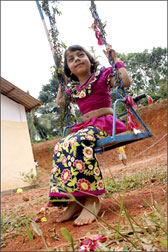
“Swinging” in the New Year
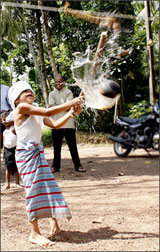
“Got it”
|
Among the traditional games, one is popularly called Wala Salli. It
is said that when the ancient mariners mostly Arabs, sailing the world
over, would have introduced it.In excavations in the past around Tisa
Weva in Anuradhapura, circular, discs so discovered are claimed by our
past archaeologists to have been used in this Wala Salli outdoor game.
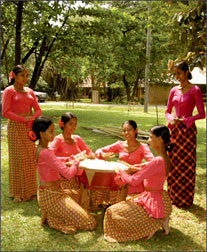 |
| Playing “Egoda
godeth raththaran, megoda godeth raththaran..” |
In Egypt this game had been termed as Nalab Fill Bora.For the
particular game, cup shaped holes were cut on the ground free from any
weeds so entwined. About three feet away, from this hole, a line was
drawn across it indicating that the disc should not go beyond this
marked line. The players should comprise two to three or four.
They stayed about ten feet away from this marked line each of the
player in hand (held by the thumb and fore fingers), a disc made out of
clay or a ten cent coin. Then he threw this disc into the hole.
The winner would be the one who had collected all the discs pitched
in the hole and then put them again into the hole. Then another larger
five cent coin was taken and thrown at one of those discs lying around
the hole and which was particularly indicated by the other players. If
the player succeeded in hitting one of those discs selected by the
players, then he collected all those discs in it. If he failed, then his
turn was over. Now came the concluding part of this game who was the
winner.
The succeeding players took part and started the game in the above
prescribed way. In this instance, he would be using the discs that had
been won by the first winner.
So this game went on in this manner until all the discs were in the
hole in this same manner. The money collected in it went to the winner.
Another ancient game is called Bola Keliya. Past archaeologists in
their extensive excavations in the Anuradhapura area (3rd-1st century
BC) had found fragments of pottery from the protery strata to make such
balls for playing this game of Bola Keliya.
In those epic times, the potters’ children would have collected such
debris from the pottery remains to make such balls for playing this game
of Bola Keliya, and thereby made them to be used by those players.
H. Parker of the British times in Ceylon (Sri Lanka), was not only a
proficient Irrigation Officer, but a prolific author of our
archaeological and heritage remains.
In his voluminous book, titled ‘Ancient Ceylon’ (1909) he has given
first hand information relating to this ancient game of Bola Keliya,
thus:-
“Similar articles are used by the children of Ceylon, the spectro
being held between the ends of the right hand and propelled by placing
the end of the fore-finger of the left hand between them behind the ball
and employing it with the left wrist, as a spring whick propels the
ball.
This ball is set against the last joint of the forefinger, the back
of that hand being turned towards the player and not as in England,
between the right hand thumb and the tip of the forefinger of that hand.
The game is that in which the players follow up each other’s marbles”. |
